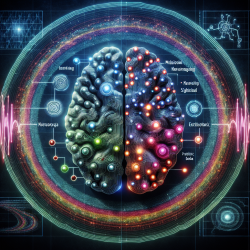The advancement of artificial intelligence (AI) has opened new avenues for healthcare, particularly in the prediction and management of complex diseases like multiple sclerosis (MS). A recent study titled "Predicting multiple sclerosis severity with multimodal deep neural networks" explores how integrating diverse data sources can significantly enhance the accuracy of predicting MS severity. This blog post aims to provide practitioners with insights into implementing these findings to improve patient outcomes and encourage further research.
The Importance of Accurate MS Severity Prediction
Multiple sclerosis is a chronic condition that affects the central nervous system, leading to varying degrees of disability. The Expanded Disability Status Scale (EDSS) is commonly used to measure MS severity. Early and accurate prediction of disease progression is crucial for timely intervention and improved patient care.
The Role of Multimodal Deep Learning
The study by Zhang et al. introduces a novel approach using multimodal deep neural networks that integrate structured electronic health records (EHR), neuroimaging data, and clinical notes. This method outperforms traditional single-modal models by up to 19% in terms of prediction accuracy as measured by the Area Under the Receiver Operating Characteristic curve (AUROC).
Key Contributions of the Study
- Pioneering Data Integration: The study demonstrates the integration of structured EHR data, neuroimaging, and clinical notes to create a comprehensive predictive model.
- Longitudinal Data Utilization: By leveraging both current and historical patient data, the model achieves more precise predictions of future MS severity.
- Data Modality Insights: The research highlights the significance of each data modality in predicting MS severity, providing guidance on improving data collection processes.
Implementing Findings in Practice
Practitioners can enhance their skills by adopting multimodal approaches in their practice. Here are some steps to consider:
- Diversify Data Sources: Encourage comprehensive data collection during patient visits, including EHRs, MRI scans, and detailed clinical notes.
- Invest in AI Tools: Explore AI platforms that support multimodal data integration for more accurate predictions.
- Pursue Continuous Learning: Stay updated with advancements in AI and machine learning through webinars, conferences, and publications.
The Path Forward: Encouraging Further Research
This study sets a foundation for future research in multimodal deep learning applications for MS. Researchers are encouraged to explore additional data sources and refine predictive models to further enhance accuracy and applicability across diverse patient populations.
Predicting multiple sclerosis severity with multimodal deep neural networks










